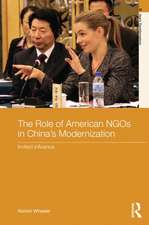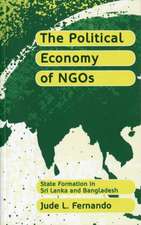NGOs and Organizational Change: Discourse, Reporting, and Learning
Autor Alnoor Ebrahimen Limba Engleză Paperback – 11 mai 2005
| Toate formatele și edițiile | Preț | Express |
|---|---|---|
| Paperback (1) | 319.74 lei 6-8 săpt. | |
| Cambridge University Press – 11 mai 2005 | 319.74 lei 6-8 săpt. | |
| Hardback (1) | 721.60 lei 6-8 săpt. | |
| Cambridge University Press – 6 aug 2003 | 721.60 lei 6-8 săpt. |
Preț: 319.74 lei
Nou
Puncte Express: 480
Preț estimativ în valută:
61.18€ • 66.67$ • 51.55£
61.18€ • 66.67$ • 51.55£
Carte tipărită la comandă
Livrare economică 23 aprilie-07 mai
Preluare comenzi: 021 569.72.76
Specificații
ISBN-13: 9780521671576
ISBN-10: 0521671574
Pagini: 192
Ilustrații: 6 b/w illus. 1 map 7 tables
Dimensiuni: 153 x 228 x 17 mm
Greutate: 0.32 kg
Ediția:Pbk.
Editura: Cambridge University Press
Colecția Cambridge University Press
Locul publicării:Cambridge, United Kingdom
ISBN-10: 0521671574
Pagini: 192
Ilustrații: 6 b/w illus. 1 map 7 tables
Dimensiuni: 153 x 228 x 17 mm
Greutate: 0.32 kg
Ediția:Pbk.
Editura: Cambridge University Press
Colecția Cambridge University Press
Locul publicării:Cambridge, United Kingdom
Cuprins
List of figures; List of tables; Acknowledgments; List of abbreviations; Introduction; 1. The making of NGOs: the relevance of Foucault and Bourdieu; 2. The NGOs and their global networks; 3. NGO behavior and development discourse; 4. Interdependence and power: tensions over money and reputation; 5. Information struggles: the role of information in the reproduction of NGO-funder relationships; 6. Learning in NGOs; 7. Challenges ahead: NGO-funder relations in a global future; Notes; References; Index.
Recenzii
'Alnoor Ebrahim has written a fine study of the multilayered and interdependent relationships between NGOs and their funders that sheds new light on this complex terrain. His book makes an important contribution to the NGO debate.' Michael Edwards, Director, Governance and Civil Society, The Ford Foundation
'This book clears a lot of debris from the superficial received wisdom about Southern NGOs. It looks deeply into how and why organizations learn, or fail to learn, and how they manage donor relationships which aim to support, but too often restrict and constrain. NGOs and Organizational Change contains valuable and sometimes disturbing insights into the real life of Southern NGOs - for managers, students and supporters alike.' Ian Smillie, co-author of Managing for Change: Leadership, Strategy & Management in Asian NGOs
'Alnoor Ebrahim also examines two Indian NGOs, but his imaginative monograph NGOs and Organizational Change: Discourse, Reporting, and Learning focuses more on the interaction between internal management and the international networks of donors. He shows that the traditional view of NGOs depending on donor monies should be revised to reflect the reality that the funders are equally dependent on the NGO information and successes.' Development and Change
'This book's creative critical (re)constructions of global accountabilities are extremely welcome. 'Accountability' is so ascendant in contemporary global governance, perhaps even aspiring to the kind of pivotal position once held by 'sovereignty' in Westphalian world politics. These authors show us how the new discourse can enable rather than frustrate societal betterment.' Jan Aart Scholte, Co-Director, Centre for the Study of Globalisation and Regionalisation, University of Warwick
'This book clears a lot of debris from the superficial received wisdom about Southern NGOs. It looks deeply into how and why organizations learn, or fail to learn, and how they manage donor relationships which aim to support, but too often restrict and constrain. NGOs and Organizational Change contains valuable and sometimes disturbing insights into the real life of Southern NGOs - for managers, students and supporters alike.' Ian Smillie, co-author of Managing for Change: Leadership, Strategy & Management in Asian NGOs
'Alnoor Ebrahim also examines two Indian NGOs, but his imaginative monograph NGOs and Organizational Change: Discourse, Reporting, and Learning focuses more on the interaction between internal management and the international networks of donors. He shows that the traditional view of NGOs depending on donor monies should be revised to reflect the reality that the funders are equally dependent on the NGO information and successes.' Development and Change
'This book's creative critical (re)constructions of global accountabilities are extremely welcome. 'Accountability' is so ascendant in contemporary global governance, perhaps even aspiring to the kind of pivotal position once held by 'sovereignty' in Westphalian world politics. These authors show us how the new discourse can enable rather than frustrate societal betterment.' Jan Aart Scholte, Co-Director, Centre for the Study of Globalisation and Regionalisation, University of Warwick
Notă biografică
Descriere
Ebrahim analyses the organizational evolution of NGOs combining case studies with extensive review of literature.














